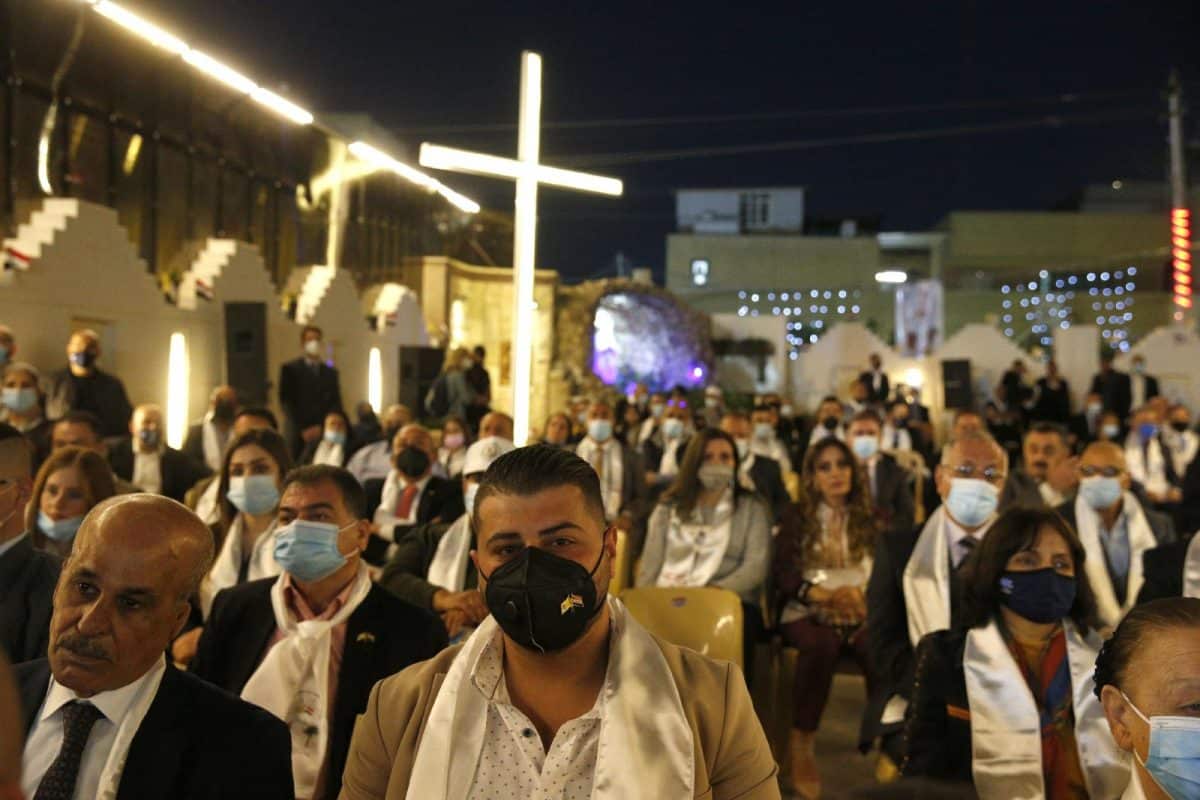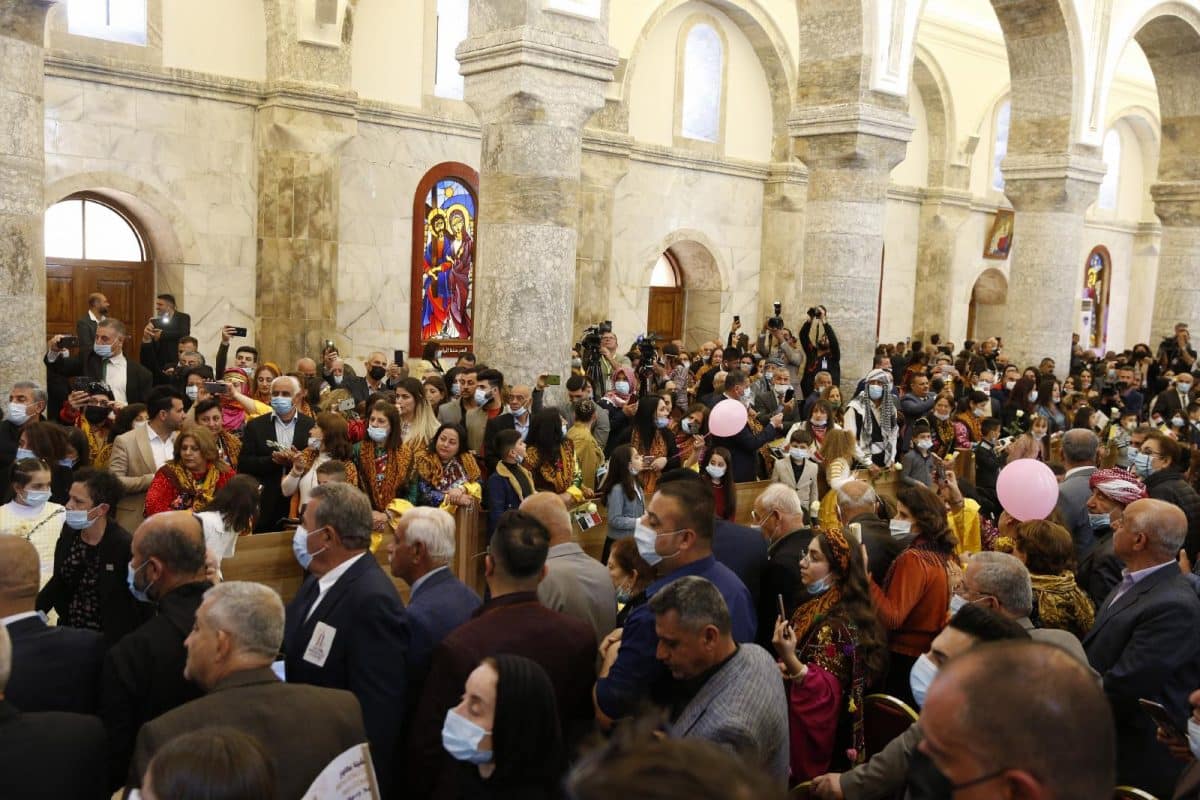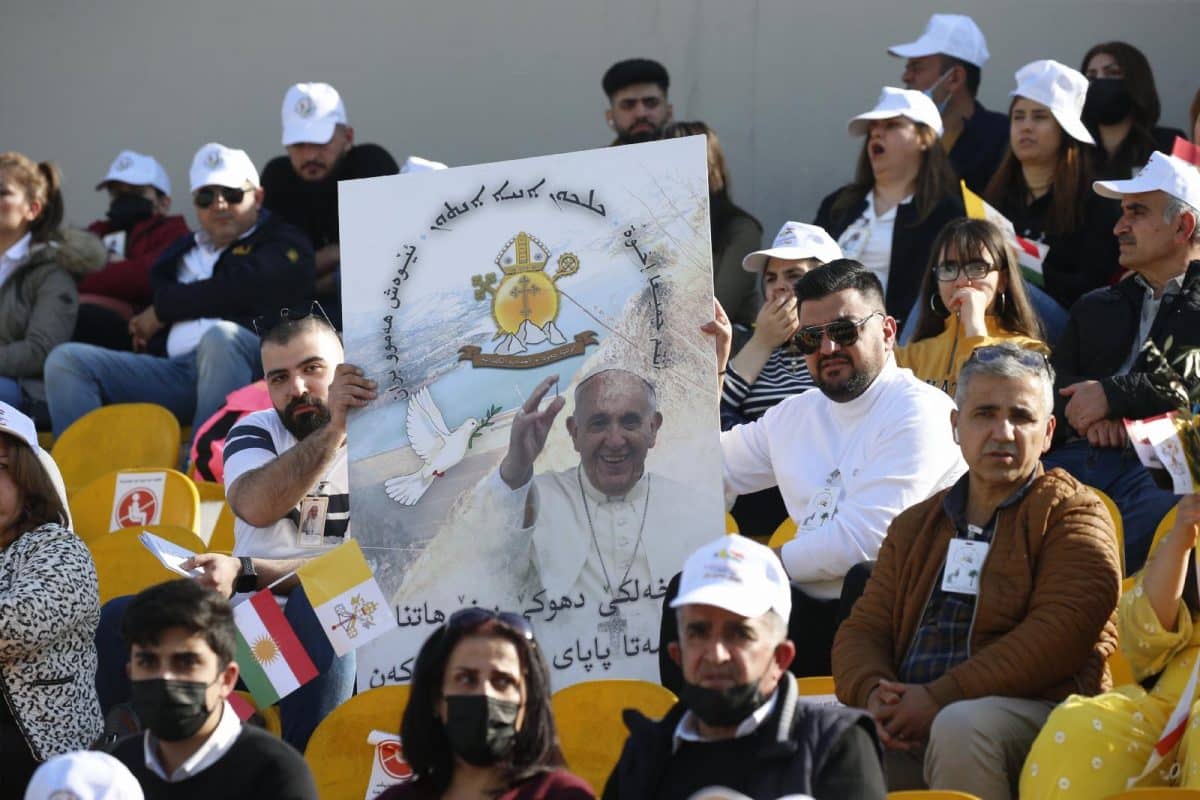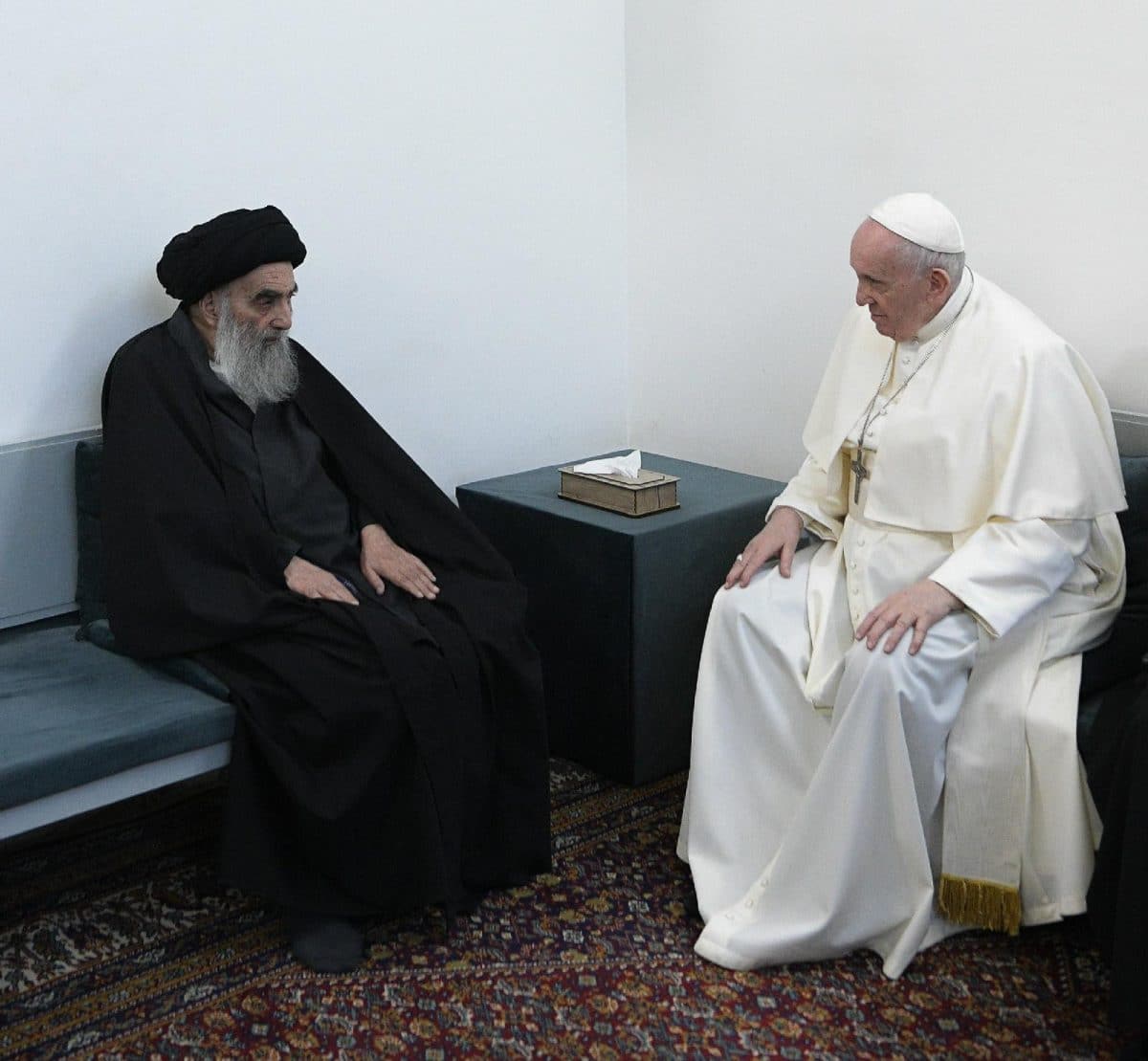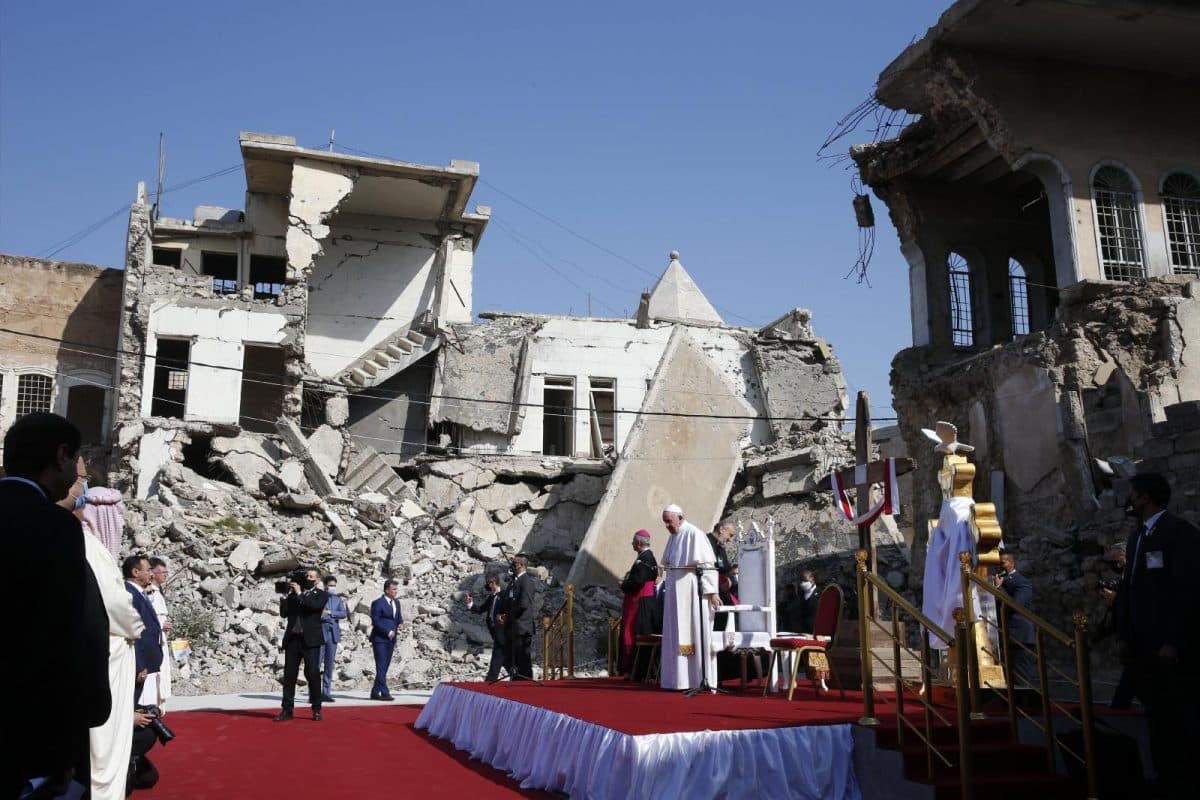
HONG KONG (SE): Pope Francis became the first pope to visit Iraq, the land from which Abraham came, when he landed in Baghdad on March 5. “I come as a pilgrim, as a penitential pilgrim to implore forgiveness and reconciliation from the Lord after years of war and terrorism, to ask God for consolation for hearts and healing for wounds. And I come among you as a pilgrim of peace, to repeat: ‘You are all brothers and sisters’,” the pope said in a message prior to embarking on his historic journey; the first since the Covid-19 coronavirus (SARS-CoV-2) struck the world.
His visit to was watched live on satellite television by thousands in Iraq and throughout the Middle East.
The Vatican said the pope’s programme included Baghdad where he met with Iraqi leaders and members of the diplomatic corps and celebrated his first Mass in the country; Najaf where he met with revered Shiite leader, Grand Ayatollah Sayyid Ali Al-Husayni Al-Sistani; the ancient site of Ur for an interreligious meeting; Irbil, Mosul and Qaraqosh, where Christians and others suffered greatly at the hands of Islamic State (ISIS) militants.
Concerns were expressed about the papal trip, announced in December 2020, due to the ongoing pandemic and a recent surge in Iraq, as well as security concerns.
Still, with himself and his entourage vaccinated against Covid-19, the pope proceeded, entrusting their safety to Iraqi security arrangements.
Upon arriving in Baghdad, the BBC reported that Pope Francis was greeted by the prime minister, Mustafa al-Kadhim, before he headed into the city in a heavily escorted convoy, along a road lined with hundreds of people, to meet with the president, Barham Salih, other government leaders and diplomats serving in the country.
Salih told the pope that pushing ahead with it “in reality doubles the value of your visit in the eyes of Iraqis.”

An overflow crowd is seen outside as Pope Francis celebrates Mass at St. Joseph Chaldean Catholic Cathedral in Baghdad March 6, 2021. (CNS photo/Paul Haring) 
People wait for Pope Francis’ arrival for a visit with the community at the Church of the Immaculate Conception in Qaraqosh, Iraq, March 7, 2021. (CNS photo/Paul Haring) 
Men display a poster with an image of Pope Francis as the wait for him to celebrate Mass at Franso Hariri Stadium in Irbil, Iraq, March 7, 2021. (CNS photo/Paul Haring) 
Pope Francis and Ayatollah Ali al-Sistani, one of Shiite Islam’s most authoritative figures, meet during a courtesy visit in Najaf, Iraq, March 6, 2021. (CNS photo/Vatican Media) 
Pope Francis participates in a memorial prayer for the victims of the war at Hosh al-Bieaa (church square) in Mosul, Iraq, March 7, 2021. (CNS photo/Paul Haring)
Pope Francis addressed the gathering, “Fraternal coexistence calls for patient and honest dialogue, protected by justice and by respect for law.” He called for people to “look beyond our differences and see each other as members of the same human family …” insisting that religion “must be at the service of peace and fraternity.”
Later, CNS reported that Pope Francis met with a group of Syriac, Chaldean, Armenian and Latin-rite Catholics, including Syriac Patriarch Ignace Joseph III Younan and Chaldean Catholic patriarch, Louis Cardinal Sako of Baghdad, along with a representative group of priests, religious, seminarians and catechists at the Syro-Catholic Cathedral of Our Lady of Salvation, which was attacked by al-Qaeda in 2010 leaving 48 people dead.
The pope said that their sacrifice and that of countless other Christians should “inspire us to renew our own trust in the power of the cross and its saving message of forgiveness, reconciliation and rebirth.”
“The different Churches present in Iraq, each with its age-old historical, liturgical and spiritual patrimony, are like so many individual coloured threads that, woven together, make up a single beautiful carpet,” one that not only “displays our fraternity, but points also to its source,” the Catholic Herald reported the pope as saying.
The different Churches present in Iraq, each with its age-old historical, liturgical and spiritual patrimony, are like so many individual coloured threads that, woven together, make up a single beautiful carpet
Pope Francis
On March 6, Pope met, in Najaf, with the 90-year-old Grand Ayatollah Ali al-Sistani, the spiritual leader of most of the world’s Shiite Muslims. In a sign of respect, the pope removed his shoes, while al-Sistani, who turns down most requests for meetings and usually remains seated for visitors, stood to greet the pope at the door of his room— a rare honour, The Guardian noted.
They met for nearly an hour after which al-Sistani “affirmed his concern that Christian citizens should live like all Iraqis in peace and security, and with their full constitutional rights,” according to a statement. He also called on the world’s religious leaders to hold those in power to account, and “to give priority to reason and wisdom, to reject the language of war, and not to expand concern for their self-interests over the rights of people to live in freedom and dignity.”
Pope Francis thanked the ayatollah and the Iraqi Shiite community, for raising their “voices in defence of the weakest and most persecuted” during some of the most violent times in Iraq’s recent history, the Vatican reported.
CNS said observers viewed the meeting as a major first step toward creating the kind of understanding Pope Francis has with Sheikh Ahmad el-Tayeb, the grand imam of Al-Azhar, who is an authority recognised by many Sunni Muslims around the world.
With the Ziggurat of Ur visible in the haze, Pope Francis insisted that when Jews, Christians and Muslims make a pilgrimage to Abraham’s birthplace, they are going home, back to the place that reminds them they are brothers and sisters.
At the site of ancient Ur, near Nassirya, Pope Francis met with an unprecedented gathering if Iraq’s religious communities including Yazidis, Mandaeans, Kakais, Bahá’ís and Zoroastrians, as well as Shiite and Sunni Muslims, and Christians.
The Catholic Herald reported that the pope emphasised that freedom of conscience and religion are fundamental rights that should be respected everywhere, adding that, “We believers cannot be silent when terrorism abuses religion.”
The pope was reported by CNS as saying, “From this place, where faith was born, from the land of our father Abraham, let us affirm that God is merciful and that the greatest blasphemy is to profane his name by hating our brothers and sisters.”
The pope stressed that “hostility, extremism and violence are not born of a religious heart: they are betrayals of religion.”
With the Ziggurat of Ur visible in the haze, Pope Francis insisted that when Jews, Christians and Muslims make a pilgrimage to Abraham’s birthplace, they are going home, back to the place that reminds them they are brothers and sisters.
Later that afternoon the pope celebrated his first Eucharistic service in the Chaldean Rite (Holy Qurbana) at the Cathedral of St. Joseph, in Baghdad.
Sunday saw Pope Francis head for Irbil, Mosul and Qaraqosh.
At Irbil the pope met with the president and prime minister of the Autonomous Region of Iraqi Kurdistan, along with civil and religious leaders. The Guardian reported that he thanked them for sheltering Christians and others who have been fleeing persecution.
In the devastated centre of Mosul, the pope stood in Hosh al-Bieaa (church square), amid the remains of Syriac Catholic, Armenian Orthodox, Syriac Orthodox and Chaldean Catholic churches destroyed between 2014 and 2017 by ISIS militants, and honoured those who suffered and died.
Pope Francis called for forgiveness during the Prayer of Suffrage for the Victims of War, saying, “If God is the God of life—for so he is—then it is wrong for us to kill our brothers and sisters in his name. If God is the God of peace—for so he is—then it is wrong for us to wage war in his name. If God is the God of love—for so he is—then it is wrong for us to hate our brothers and sisters.”
The Guardian reported that the pope listened to the stories of Christians forced to flee, the fear many have of returning and the encouragement offered by Muslim neighbours committed to making the city a thriving, multicultural metropolis again.
‘It’s great to see the pope; we never expected him to come to Qaraqosh. Maybe that will help to rebuild the country, finally bringing love and peace’
Mounir Jibrahil
Later, Pope Francis visited Qaraqosh, which bore the brunt of ISIS’ genocidal onslaught. He was met by the largest crowds of his visit, who lined the streets. While security concerns meant he was compelled to use an armoured Mercedes-Benz though he had the window down and the driver going slow enough that the police and security officers on foot did not even have to jog.
Less than half of Qaraqosh’s inhabitants have returned since the militants were ousted in 2016.
Bells pealed to welcome the pope to the Syriac Catholic Church of the Immaculate Conception, desecrated during its use as a base by ISIS fighters, who turned the courtyard into a shooting range, CNS reported.
Community leaders joined in the enthusiastic welcome, with elders from across the region sitting alongside clerics, according The Guardian.
While much of the city still needs to be rebuilt, Pope Francis said the presence of the jubilant crowds inside and outside the church “shows that terrorism and death never have the last word.”
The pope said, “The last word belongs to God and to his son, the conqueror of sin and death. Even amid the ravages of terrorism and war, we can see, with the eyes of faith, the triumph of life over death.”
CNS reported Mounir Jibrahil, a 61-year-old math teacher, as saying, “It’s great to see the pope; we never expected him to come to Qaraqosh. Maybe that will help to rebuild the country, finally bringing love and peace.”
Celebrating Mass at Irbil’s Franso Hariri Stadium, the penultimate event of his visit, Pope Francis blessed a partially restored statue of Mary from a parish in Karmless, which was decapitated and its hand cut off by ISIS militants.
“Here in Iraq, how many of your brothers and sisters, friends and fellow citizens bear the wounds of war and violence, wounds both visible and invisible,” the pope told the crowd of some 10,000 people.
“The temptation is to react to these and other painful experiences with human power, human wisdom,” but the path of Jesus was to serve, to heal, to love and to offer his life for others, the pope said.
At the end of the Mass CNS reported that Chaldean Catholic Archbishop Bashar Warda of Irbil thanked the pope for travelling to Iraq during the pandemic, telling the pontiff he made real the saying, “Do not be afraid.” The archbishop said Iraqis must give life to the pope’s message of peace, brotherhood and forgiveness.
Addressing the crowd and those watching on television, Pope Francis said: “Now the time I must leave for Rome draws near. But Iraq will always remain with me in my heart. I ask all of you, dear brothers and sisters, to work together in unity for a future of peace and prosperity that leaves no one behind and does not discriminate against anyone. I pray that members of the different religious communities, together with men and women of good will, cooperate to strengthen the bonds of fraternity and solidarity at the service of the good and for peace. Salaam, salaam, salaam, shukran and God bless everyone, God bless Iraq, Allah ma’akum (God be with you).”
The pope departed for Baghdad that evening and on March 8, following a short farewell ceremony, returned to Rome.

